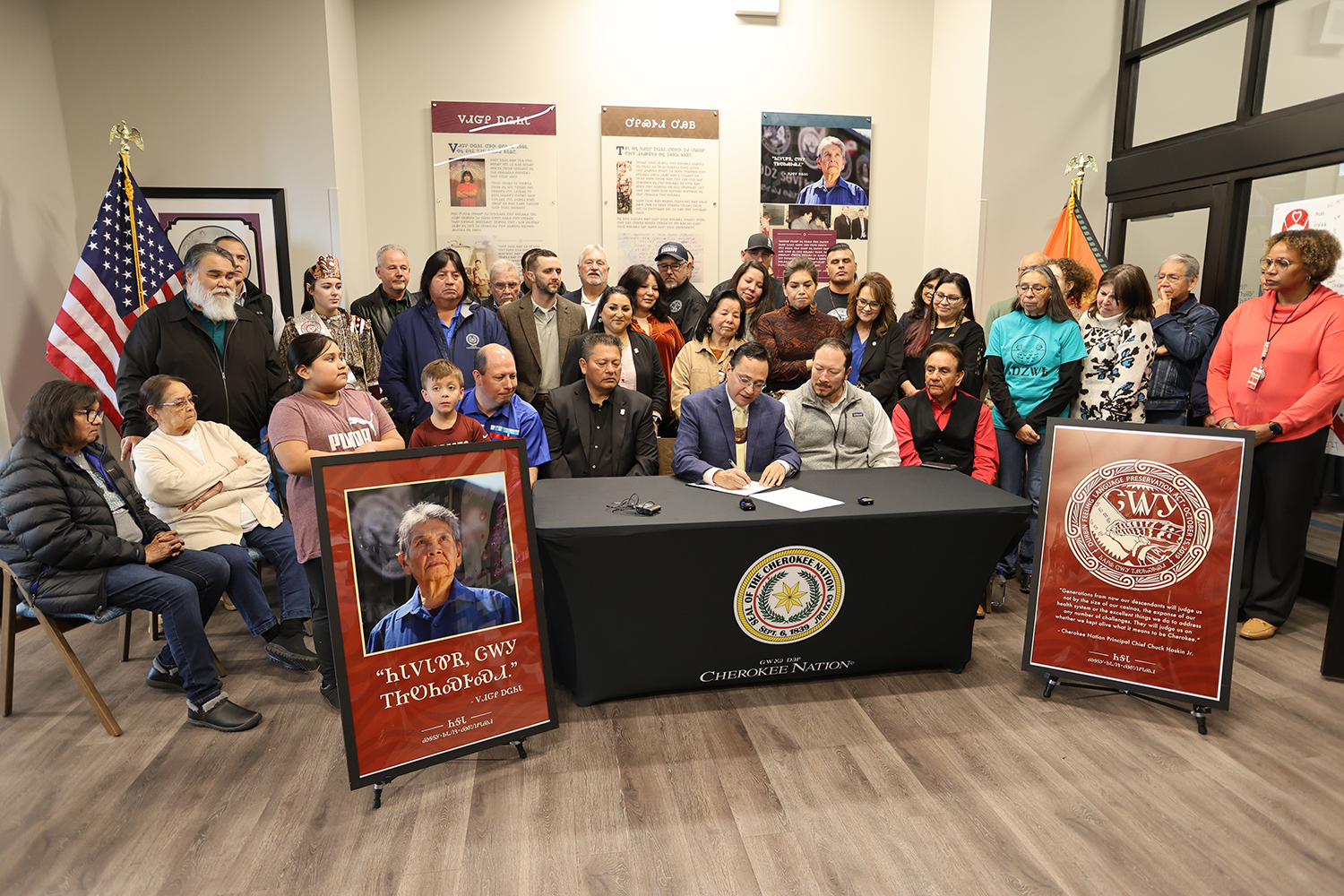
- Details
- By Native News Online Staff
The Cherokee Nation Language Department is offering a series of free Cherokee language courses available both on the Cherokee Nation Reservation and in at-large communities. Classes will require either in-person participation or a blend of virtual and in-person attendance.
“Language connects us to our ancestors, our identity and our place in the world. Revitalizing our unique Cherokee language is a sacred duty,” said Cherokee Nation Principal Chief Chuck Hoskin Jr. “Offering classes to teach our language, not only here on the Cherokee Nation Reservation but to Cherokee citizens around the country, is an opportunity that this administration is honored to support.”
The Cherokee Nation Language Department is committed to revitalizing the Cherokee language by bringing up more proficient Cherokee speakers. Hosting Cherokee language courses inside and outside the tribe’s reservation is one important way to provide more opportunities for revitalization.
Cherokee Nation’s language programs have experienced massive growth in recent years under the tribe’s Durbin Feeling Language Preservation Act, first proposed by Chief Hoskin and Deputy Chief Bryan Warner in 2019. In 2024 the Council of the Cherokee Nation made the law permanent, setting spending targets for language programs that now exceed $20 million annually.
“Our goal is to normalize the Cherokee language for our citizens, hearing it in media, online, and in their community,” said Cherokee Nation Language Department Executive Director Howard Paden. “We have several second-language families who speak primarily Cherokee at-home, meaning children in the Cherokee Nation are now learning Cherokee before English. Learning Cherokee first means that they speak in Cherokee and think in Cherokee. It is more than learning a language. It becomes a way of life. This is what it means to revitalize the language.”
There are only an estimated 1,500 first-language Cherokee speakers, with several thousand more considered second-language speakers who are at conversational or proficient levels.
Times and locations of the classes are subject to change. Contact the Cherokee Nation Language Department at 918-297-4901 or [email protected] for more information.
In-person language classes within the Cherokee Nation Reservation:
- Instructor Sandra Turner, Feb. 24-May 2, 6:30-7:30 p.m., Mondays and Thursdays at Salina Early Learning Center
- Instructor Dennis Sixkiller, March 10-May 12, 6:00-8:00 p.m., Mondays at TriCommunity WEB in Briggs
- Instructor Treesa Vann, March 10-May 12, 6:00-8:00 p.m., Mondays and Thursdays at Oaks Senior Center
- Instructor Jennie Clinton, April 1-June 30, 6:00-8:00 p.m., Thursdays at Cookson United Methodist
- Instructor Becky Drywater, March 20-May 22, 6:00-8:00 p.m., Thursdays at Elm Tree Baptist in Tahlequah
- Instructor DJ McCarter, March 23-May 25, 6:30-8:30 p.m., Mondays at Elm Tree Baptist in Tahlequah
- Instructor Lois Deason, March 25-May 30, 6:00-7:00 p.m., Thursdays at the Durbin Feeling Language Center in Tahlequah
- Instructor Russell Feeling, March 25-April 24, 6:00-8:00 p.m., Tuesdays and Thursdays at New Jordan Fellowship in Salina
- Instructor George Stopp, March 25-June 1, 6:30-8:30 p.m., Tuesdays at Chewy Community Center
- Instructor Matthew Church, April 5-June 7, 10a.m.-noon, Saturdays at Caney Community Center
- Instructor Harry Oosahwee, April 13-May 15, 6:00-8:00 p.m., Thursdays at the Spider Gallery in Tahlequah
- Instructor Phyllis Sixkiller, April 17-June 19, 6:00-8:00 p.m., Thursdays at Muldrow Community Building
At-large, in-person Cherokee language classes:
- March 22 and 23, 9 a.m. to 4 p.m. at the First Americans Museum in Oklahoma City
- April 26 and 27, 9 a.m. to 4 p.m. at the Lane Community College Longhouse in Willamette, Oregon
- May 3 and 4, 9 a.m. to 4 p.m. at the Daybreak Star Indian Cultural Center in Seattle, Washington
- September 13 and 14, 9 a.m. to 4 p.m., location to be determined near San Diego, California
A number of at-large Cherokee community groups will host Cherokee language classes that require both in-person and virtual participation on various dates throughout 2025. Those interested in attending should contact the specific community groups for more information on how to participate by pre-registering, or watch their emails for messaging sent via the Cherokee Nation Gadugi Portal. Contact information for community groups is available online at https://cherokeesatlarge.org/.
- Kansas City Cherokee Community
- Willamette Tsa-la-gi Community
- Cherokee Community of Puget Sound
- Cherokees of Central Florida
- East Coast Cherokees
- Gadugi Cherokees
- TsaLaGi LA
- Cherokee Community of North Texas
- San Diego Cherokee Community
- Georgia Cherokee Community Association
More Stories Like This
NCAI Passes Two Emergency Resolutions on Immigration Enforcement ActivitiesChickasaw Lighthorse Police Officer named Indian Country Law Enforcement Officer of the Year
Indian Gaming Association Rallies Broad Coalition Against Sports Event Contracts It Calls Illegal Threat to Tribal Sovereignty
Navajo Resources and Development Committee Issues Notice on Livestock Inspection Requirements
American Prairie, Tribal Coalition Files Protest Over Rescinded Grazing Rights
Help us defend tribal sovereignty.
At Native News Online, our mission is rooted in telling the stories that strengthen sovereignty and uplift Indigenous voices — not just at year’s end, but every single day.
Because of your generosity last year, we were able to keep our reporters on the ground in tribal communities, at national gatherings and in the halls of Congress — covering the issues that matter most to Indian Country: sovereignty, culture, education, health and economic opportunity.
That support sustained us through a tough year in 2025. Now, as we look to the year ahead, we need your help right now to ensure warrior journalism remains strong — reporting that defends tribal sovereignty, amplifies Native truth, and holds power accountable.
 The stakes couldn't be higher. Your support keeps Native voices heard, Native stories told and Native sovereignty defended.
The stakes couldn't be higher. Your support keeps Native voices heard, Native stories told and Native sovereignty defended.
Stand with Warrior Journalism today.
Levi Rickert (Potawatomi), Editor & Publisher


